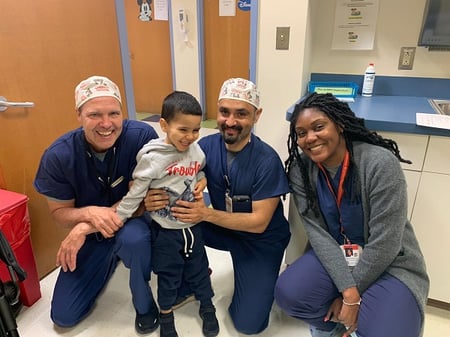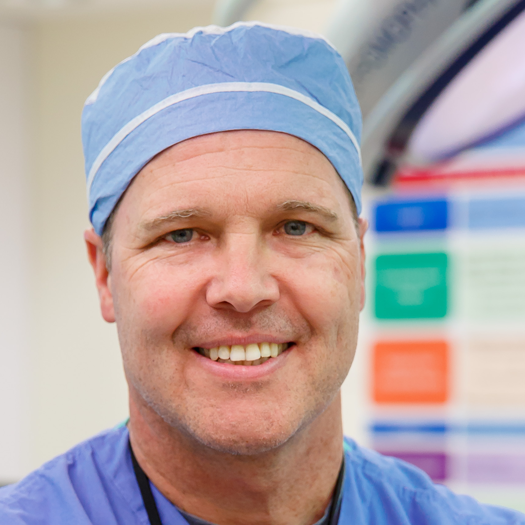
William's Story

For the first time in his life, a day after having a life-changing procedure in May 2022, 3-year-old William of Brisbane, Australia, was almost able to drink an entire cup of milk — something his mother, Jessica, thought might never be possible for her son. Thanks to the Children’s National Hospital General and Thoracic Surgery and Global Services teams, Jessica said she now sees joy instead of pain on her son’s face when he eats and drinks.
“This is like a dream,” Jessica said. “I get to see my son not in pain anymore.” William was born with type III esophageal achalasia, the most severe form of a rare esophageal disorder that impairs the esophagus from squeezing food into the stomach, causing regurgitation, vomiting, painful swallowing and weight loss. William’s case was so severe he was unable to eat or drink from birth and suffered from choking and vomiting episodes.
“He would choke and go blue in the face. He would become unresponsive, and his Dad and I would call an ambulance. I did not sleep properly for the first years of William’s life because of the fear he would suffocate on vomit in his sleep,” Jessica said. “There was nothing scarier as a mother than looking at my son’s face and seeing the terror and pain in his eyes.”
After several choking episodes and many hospital visits, William’s condition was not improving, and Jessica invoked Ryan’s Rule, a process for patients in Australia to obtain a second medical opinion. Finally, William received a diagnosis of type III esophageal achalasia, but there were no doctors in the country who had treated a child as young as William for this condition. With no medical team or doctor in Australia able to help William and after all other treatment options failed, Jessica turned online for answers and learned about the Esophageal and Thoracic Surgery Program at Children’s National. At Children’s National, surgeons perform peroral endoscopic myotomy (POEM) on pediatric patients, an endoscopic procedure that treats swallowing disorders like William’s.
Beyond Children’s National, the procedure is frequently performed on adults but rarely offered for children because of the highly specialized training, tools and skills it requires. Children’s National is the largest of only two centers in the country offering POEM for children and the only center where it is offered for children as young as William. The minimally invasive procedure is performed in tandem by Timothy Kane, M.D., division chief of General and Thoracic Surgery, and Mikael Petrosyan, M.D., associate chief of General and Thoracic Surgery, who have successfully performed POEM for over 50 pediatric patients since 2015. For William’s parents, the decision to travel from Australia to Washington, D.C., for expert care was an obvious one.
Providing Hope After Everything Has Failed
“It is an honor to be able to help kids from anywhere, but when they travel from across the world to see us, it is truly humbling and an extreme privilege that we do not take lightly,” Dr. Kane said. “Dr. Petrosyan and I do these procedures together as co-surgeons.”
The two surgeons learned to perform POEM from an adult surgeon and then adapted it and to successfully perform on children. “It is a complex procedure with a long learning curve. It is even more challenging because children come in many sizes and achalasia is very rare.”
A Team-Based Approach: Two Surgeons Perform One Surgery in Tandem
“We are unique because we are two surgeons who understand each other very well. Dr. Kane trained me, and I am a product of Children’s National,” Dr. Petrosyan said. “I know what he expects, and he knows what I expect. We know each other’s strengths and shortcomings. That is required in this procedure and one of the reasons we are successful,” he said.
He also cited the Children’s National investment in treating patients with rare diseases, strong support from hospital leadership, and being among the top hospitals and training programs in the country as unique factors for the program to thrive.
Dr. Kane and Dr. Petrosyan recently published a study examining outcomes for patients over a year from their procedures. They hope to begin training other pediatric surgeons to perform POEM in children.
“Because of all the advantages we have here at Children’s National, we can offer specialized care that is unique for each patient we see,” Dr. Petrosyan said.
“William has autism and they were very understanding of his needs throughout our time,” Jessica said. “I remember in the operating theater, I was able to be with him as they gave him anesthetics since that could have upset him. Dr. Kane came over as he fell asleep, and said to me, ‘He’s in good hands, Mom.’ I felt such reassurance because I knew he was. It was what I needed. This was what William needed.”
She is looking forward to William eating his first birthday cake on his fourth birthday this summer.
“It has been such a life change that he can tell me he is hungry, and we can give him food and water. His mood and behavior are improving because he is not in pain all the time,” she said. “He is loving life.”



